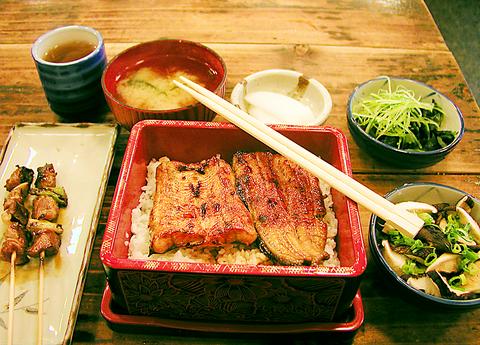The neighborhood around Tienchin Street between Changan Road and Nanking Road is chock full of Japanese restaurants that are visible reminders that this area was previously home to much of the Japanese colonial administration. Now the narrow alleys are a favorite haunt of Japanese businessmen and tourists, as well as hip young Taiwanese.
Fei Qian Wu is not the oldest restaurant in the neighborhood, but it is easily the busiest, due mainly to its low prices and delicious roasted eel. As soon as its doors open crowds begin to converge so that about 20 minutes into its business hours there is already a line out the door and down the alley. With this kind of meal-time crunch, space is at a premium and it's common to share a table with strangers.
The cafeteria feel of the restaurant's seating arrangement extends to its service as well. A small legion of servers scurries about filling orders while others clear tables using clackety pushcarts. Food arrives at the table in no longer than five minutes from the time of ordering.

PHOTO: MAX WOODWORTH, TAIPEI TIMES
Despite the clear emphasis on turning high numbers of tables, not many shortcuts appear to be taken in the kitchen.
Most diners will make a special trip to Fei Chien Wu to eat its roasted eel, which is several cuts above the usual fare at similarly priced Japanese restaurants. A single portion of eel on rice with miso soup costs NT$140, while a double portion comes in at NT$240.
The double portion of eel would be plenty for one person, but it is well worth it to flesh out a meal with some of the smaller dishes on offer. Try the grilled squid, which is sufficient for up to four people or the shrimp and vegetable tempura. The best value must be the chicken kebabs, which cost only NT$20 a piece. The grilled and marinated mushrooms and seaweed are also refreshing choices for summer that cost NT$40 each.
This restaurant does not score high marks in the atmosphere category, but then it's the food and not the ambiance that has kept the store running for over 20 years. First-time visitors to Fei Chien Wu need not be dismayed if there is a line outside the restaurant. The owners see to it that the line moves quickly and the food will make the wait worthwhile.

June 9 to June 15 A photo of two men riding trendy high-wheel Penny-Farthing bicycles past a Qing Dynasty gate aptly captures the essence of Taipei in 1897 — a newly colonized city on the cusp of great change. The Japanese began making significant modifications to the cityscape in 1899, tearing down Qing-era structures, widening boulevards and installing Western-style infrastructure and buildings. The photographer, Minosuke Imamura, only spent a year in Taiwan as a cartographer for the governor-general’s office, but he left behind a treasure trove of 130 images showing life at the onset of Japanese rule, spanning July 1897 to

One of the most important gripes that Taiwanese have about the Democratic Progressive Party (DPP) is that it has failed to deliver concretely on higher wages, housing prices and other bread-and-butter issues. The parallel complaint is that the DPP cares only about glamor issues, such as removing markers of Chinese Nationalist Party (KMT) colonialism by renaming them, or what the KMT codes as “de-Sinification.” Once again, as a critical election looms, the DPP is presenting evidence for that charge. The KMT was quick to jump on the recent proposal of the Ministry of the Interior (MOI) to rename roads that symbolize

On the evening of June 1, Control Yuan Secretary-General Lee Chun-yi (李俊俋) apologized and resigned in disgrace. His crime was instructing his driver to use a Control Yuan vehicle to transport his dog to a pet grooming salon. The Control Yuan is the government branch that investigates, audits and impeaches government officials for, among other things, misuse of government funds, so his misuse of a government vehicle was highly inappropriate. If this story were told to anyone living in the golden era of swaggering gangsters, flashy nouveau riche businessmen, and corrupt “black gold” politics of the 1980s and 1990s, they would have laughed.

It was just before 6am on a sunny November morning and I could hardly contain my excitement as I arrived at the wharf where I would catch the boat to one of Penghu’s most difficult-to-access islands, a trip that had been on my list for nearly a decade. Little did I know, my dream would soon be crushed. Unsure about which boat was heading to Huayu (花嶼), I found someone who appeared to be a local and asked if this was the right place to wait. “Oh, the boat to Huayu’s been canceled today,” she told me. I couldn’t believe my ears. Surely,